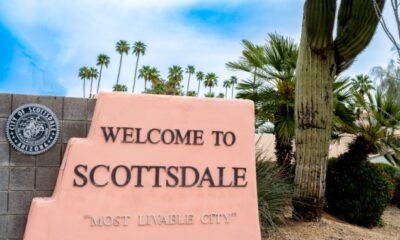bed tax
2024 Sales Taxes Set to Surpass Inflation Concerns

The Sedona City Council convened on October 8 to review the final financial figures for the city’s fiscal year 2024, covering sales and bed tax collections from July 2023 to June 2024.
Total sales tax revenue reached $33,441,918, marking a $1.67 million increase, or 5%, from the previous fiscal year. In addition, bed tax collections totaled $9,340,377, an increase of $752,388, or 9%, leading to an overall tax collection of $42,782,295 for 2024.
Data from the U.S. Department of Labor indicated an inflation rate of 2.4% for the year ending September 2024.
Vice Mayor Holli Ploog described the bed tax levels as “pretty flat but higher,” reflecting a steady trend in that sector. Notably, the construction sector saw the most significant revenue increase, up 12% year over year. Leasing, hotels, and motels also contributed positively, each increasing by 9%. Restaurants and bars recorded a 6% rise, with amusement venues at 4% and retail growth at 1%.
March and April emerged as the strongest months for sales tax, generating revenues of $3,710,005 and $3,297,969, respectively. Bed tax receipts peaked in March and October, with collections of $1,198,616 and $963,131; May followed closely with $944,627. Conversely, August was the weakest month for both sales and bed tax, totaling $2,088,510 and $492,948, respectively.
Breaking down sales tax collections, hotel sales contributed 28.6%, retail accounted for 32.5%, and restaurants and bars represented 19%. Non-tourism related sectors contributed less than 20% of the total sales tax collections, indicating a strong reliance on tourism, which provided at least 84.6% of the city’s tax revenues.
Councilwoman Melissa Dunn emphasized the dependency on tourism: “Without tourism, we don’t have the taxes.” Ploog also raised concerns about economic diversification, noting the city’s heavy reliance on a singular industry. Sedona’s zoning regulations restrict agricultural uses, and out of approximately 7,000 parcels, only 56 are zoned for industrial use.
Construction revenue totaled $2,113,554 for the year, amounting to a construction activity value of $60.39 million within the city. Of this, the city initiated various projects, including over $24 million worth of contracts issued for improvements to Ranger Station Park, the Uptown median, the Uptown garage, and pickleball courts.
Councilman Brian Fultz queried the impact of high average daily room rates, which fluctuated between $250 and $425, on visitor spending in other areas. Andrew Grossmann, the city’s new tourism manager, acknowledged the possibility of a shift in spending but emphasized a need for further investigation. “Yes, that is theoretically possible,” he remarked.
Ploog then posed a question regarding the effect of increased hotel development on short-term rentals. Grossmann responded that the outcome would depend on the specific hotels being built, stating that while national data indicated a decline in short-term rental bookings, Sedona did not reflect that trend.
Outgoing Councilwoman Jessica Williamson remarked on the high interest from hotel developers in Sedona. Councilman Fultz noted the resilience of the hotel sector, suggesting that the local market had absorbed the increase in short-term rentals without significant detriment to hotel occupancy.
Fultz expressed hope for more detailed short-term rental data becoming available in the future. Previous discussions highlighted a lack of transparency regarding the contribution of short-term rentals to city revenue, raising questions about the city’s data-sharing practices.


















